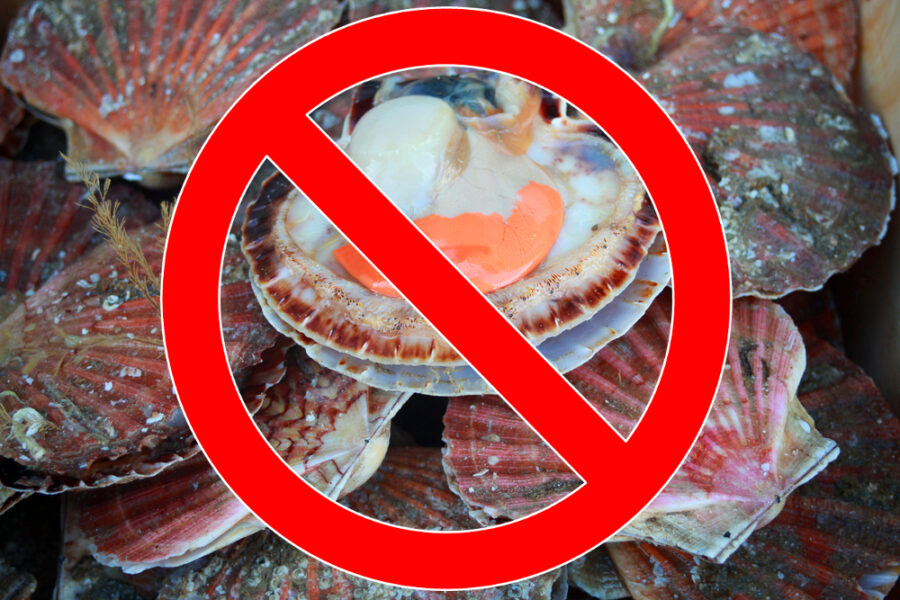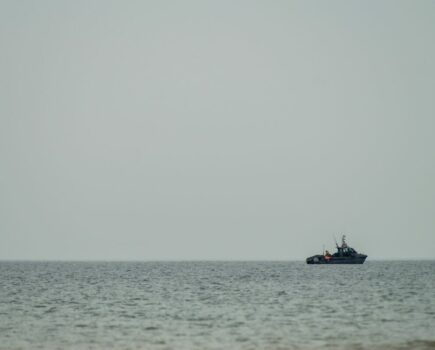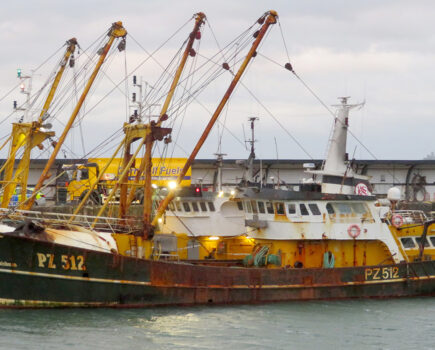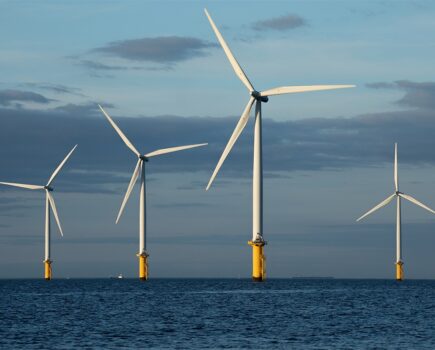Scallop talks collapse as French pull out – Payments to under-15s scupper deal
There will be no deal on scallop fishing in the Baie de Seine area in 2018, after the French industry pulled out of talks to finalise a deal at the end of last week, reports Tim Oliver
The breakdown centred on compensation payments to UK under-15m scallopers for staying out of the area until 1 October, when the area is opened up to French scallopers.
UK and French industry leaders and officials had failed to reach agreement on this aspect of the deal the previous week, but UK and French officials were still in talks last week, until the French pulled out.
Agreement had been reached that over-15m UK vessels would leave the area, in exchange for a transfer of Western Waters days at sea from the French. Although it seemed at the first round of talks that this part of the deal was secure, the failure to agree on compensation for the under-15m vessels means this has collapsed, and there is now no deal at all.
French industry body CNPMEM issued a statement saying it regretted withdrawing from the talks, and the failure to reach agreement, and blamed the UK for inflexibility and making ‘exorbitant demands’.
A CNPMEM spokesman said: “Despite the considerable efforts that French fishermen working in the Channel were willing to make in terms of compensating the British for suspending their activities, the British side pressed for exorbitant amounts in compensation. We cannot accept that French fisheries should be held to ransom in this way.
“We regret that it is not possible to reach an agreement, and we have informed the minister of agriculture that we are ending the discussions.”
UK fisheries minister George Eustice said he had written to French minister Stéphane Travert to express his disappointment at the failure to reach agreement.
“We must ensure that the French authorities enforce the industry’s right to fish in those waters”

UK fisheries minister George Eustice,
In a statement to the House of Commons last Thursday (13 September), he told MPs that UK and French officials had been in discussions, and that there was ‘greater understanding of the UK’s evidence’ on the extent of the UK fleet’s fishing in the Baie de Seine, as the basis of a compensation package for the under-15m fleet.
“However, the offer made by the French industry remained unchanged from that discussed in Paris on Friday,” he said.
“The UK industry does not believe that the compensation package proposed by the French fishing industry provides sufficient recompense for its projected loss of earnings, and has rejected it on that basis.
“The French industry is currently unwilling to accept an offer to put back in place the agreement that has applied to the over-15m fleet for a number of years. As a result, the talks have broken down, and there remains no agreement at all.”
He said the UK government has offered to assist French enforcement authorities with MMO personnel ‘should they want to consider joint operations, given the risk of further altercations’.
“We have been consistently clear with the French government that we have no legal basis to instruct or tell our fishing industry not to fish in that area, and neither have we ever done so,” the minister told MPs.
“We were also clear with our fishing industry that we would not have told people not to fish in those areas, but the industry itself voluntarily chose not to fish there during the period of negotiation. It rightly recognised that, because negotiations were ongoing, it would be helpful to avoid further altercation. The industry took that choice, but now that talks have broken down, we must ensure that the French authorities enforce the industry’s right to fish in those waters.”
Alternative options
George Eustice has also asked the French government to consider alternative options.
“First, it seems to me that putting back in place the agreement for the over-15m fleet, which has stood the test of time over the past five years, would be preferable to no agreement at all, and I hope that the French industry will reconsider its position.”
He said that the inward transfer of effort would generally go unused, if it was not used for this purpose.
“Secondly, it is open to the French government to lift the domestic restrictions they have in place earlier than they normally would, in order to address concerns that their industry has expressed about the lack of a level playing field.”
He reiterated that the UK industry is legally allowed to fish in the Baie de Seine, and said it had shown ‘commendable restraint’ during the negotiations.
“I welcome its co-operation and understanding. It is for the industry to decide where it fishes, as long as that is done legally. In my letter to Minister Travert, I emphasised the absolute need for safety to remain paramount. I hope that a mutually beneficial outcome might still be agreed between the two industries but, in the meantime, we stand ready to offer what assistance the French government may wish to consider,” the minister concluded.
Jim Portus, chairman of the Scallop Industry Consultative Group and chief executive of the South Western FPO, said that, unrelated to the talks, scallopers were fishing in the eastern Channel north of Dieppe, away from the disputed zone.
“There is sufficient economic activity to keep them there. They are not being economically driven to the Baie de Seine, but there is nothing to stop British boats fishing there now,” he said.
UKIP: French ‘in a dream world’
MEP Mike Hookem, the UKIP fisheries spokesman, said that the French seemed to expect the British ‘to roll over and accept a deal with little compensation’, and that the French statement did not reflect the reality of the situation.
Speaking from Strasbourg, Mike Hookem said: “The law is clear under the CFP – British vessels under 15m are allowed to harvest scallops in the Baie de Seine all year round. It is not up to the French to pick and choose which EU law they follow!
“If the French expect British fishers to merely stop fishing without a compensation package of equal value to their potential catch, then they are living in a dream world.
“My concern, following the collapse of these talks, is a return to the disgraceful attacks we saw on British fishers two weeks ago. That is why I am demanding that both the European Union and the British government act to protect British fishermen going about their lawful work.
“So far, the EU has sat on its hands, despite my demands in parliament and questions to the commissioner. It is EU law that has driven British fishers to harvest these areas, and it’s EU law that is being threatened by the protectionism from France. However, where are the fines and the denouncements of these illegal actions by the French?
“As for protection for British fishermen from our government… well, I’m not going to hold my breath!”
Talks breakdown ‘disappointing’
At earlier talks, it was agreed in principle that French POs would rent whitefish quota to English POs, and the money paid would go into a compensation fund (Fishing News, 13 September, ‘Two-part scallop deal’).
But when the two sides met again to discuss the details, the talks broke down.
Mike Park, chief executive of the Scottish White Fish Producers’ Association, was at the last round of talks involving the industry, before UK and French officials tried to reach agreement. He said the breakdown was disappointing, because it was thought the main terms of the deal had already been agreed at the earlier meeting. But, he said, it became obvious from the start that ‘the French understanding of it was very different from ours’.
He told Fishing News: “The primary reason for the failure to agree was the distance between what the French perceived to be the level of compensation to be applied, and the level of compensation we required.”
He said that a number of the under-15m vessels made a third of their income in the Baie de Seine in the period before the French are allowed to fish there, from 1 October, and therefore needed cash compensation if they had to leave the area. But that required a complicated package that would be ‘a complex structure to deliver’.
“The problem was that the value of what they were offering was widely at odds with our requirements,” said Mike Park.
He said officials from the British and French governments had tried to agree ‘an appropriate level of compensation, based on information from their economists and statisticians’ on issues such as how much the vessels would lose by leaving the area.
“The French are limited. The payments will have to basically come out of the scallop POs, but they’re limited in terms of the amount of fish they have in the POs,” he said.
“There were two main areas of discussion. One was that the French didn’t agree with us on what the level of compensation should be, and the second was that they didn’t have enough commodity in their POs to be able to pay anything greater than the compensation they offered, so it’s a difficult dynamic.”








